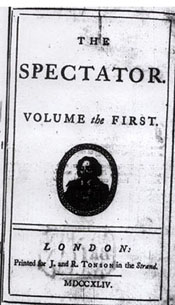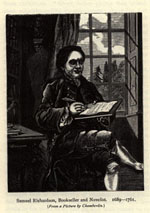Customer: Other than you Mr. Tonson, who are some of the other major booksellers of the period, your rivals?
Tonson: Well, not too many people could rival me, considering I was such a novel entrepreneur when I hit the scene. However, there are indeed a few important sellers, all men of course, who made their mark on the industry. Bernard Lintot, who owned a business at the Temple Gates, attempted to rival my business in many ways. He introduced Pope's "Rape of Lock" and offered Pope a great deal of money for his Homer translations. Lintot was an amusing fellow and a smart businessman. Lintot told Pope the following story, which illustrates these traits:
I can silence the most formidable of them [customers/critics]; the rich ones for a sheet a-piece of the blotted manuscript, which costs me nothing; they'll go about to their acquaintance and pretend they had it from the author, who submitted to their correction: this has given some of them such an air, that in time they come to be consulted with, and dictated to as the top critic of town. As for the poor critics, I'll give you one instance of my management, by which you may guess at the rest. A lean man, that looks like a very good scholar, came to me t'other day; he turned over your [Pope] Homer, shook his head, shrugged his shoulders, and pished at every line of it. One would wonder, says he, at the strange presumption of some men; Homer is no such easy task, that every stripling, every versifier--He was going on , when my wife called to dinner. 'Sir,' said I, 'will you please to eat a piece of beef with me?' 'Mr. Lintot,' said he, 'I am sorry you should be at the expense of this great book; I am really concerned on your account.' 'Sir, I am much obliged to you; if you can dine upon a piece of beef, together with a slice of pudding.' 'Mr. Lintot, I do not say but Mr. Pope, if he would condescend to advise with men of learning--' 'Sir, the pudding is on the table, if you please to go in.' My critic compiles, he comes to a taste of your poetry, and tells me in the same breath that the book is commendable and the pudding excellent.40
He took a great risk in publishing Pope's six volume Iliad, giving him such a huge contract for it, but it was the great success of his career, as he could hand the business over to his son Henry, who ultimately died and gave 45,000 pounds to his daughter Catherine; much of that money was of course inherited from Bernard in the first place.41
Customer: I've heard of Edmund Curll; what's his story?
Tonson: Mr. Curll is one of the most infamous booksellers of the eighteenth century. As Mist's Weekly Journal described him:
The fellow is a contemptible wretch in a thousand ways; he is odious in his person, scandalous in his fame;...more beastly, insufferable books have been published by this one offender than in thirty years before by all the nation.42
He published a great deal of politically and morally objective materials. For instance, he was called before the House of Lords for printing An Account of the Trial of the Earl of Winton; such accounts of House trials were prohibited by House law . Curll got down on his knees and somehow managed to convince the Lord Chancellor to let him go, and he received a mere fine for his crime. His troubles would continue, as Curll was always after making a pound off something controversial before following the rules.
On November 30, 1725, Curll was actually convicted of printing and publishing several obscene and immodest books, greatly tending to the corruption and depravation of manners.43 Ironically, at his shop in Covent Garden, he had a picture of the Bible as his sign, though Curll was anything but a pious bookseller. He sold something called "Nun in her smock," which I heard was incredibly lewd, and I wouldn't want to go near it. Curll was fond of a drink quite often, which ultimately led to his death.44
A serial publication from your humble bookseller, Mr. Tonson.45
The lady's man himself, Mr. Samuel Richardson.48
Customer: Were any authors also booksellers?
Tonson: Actually yes, the most famous of which was Samuel Richardson, the author Pamela and Clarissa and the first great English novelist and quite a vain fellow.46 He owned a fairly small and obscure shop on Fleet Street, where he also spent much of his time writing. His big sell was with Wharton's True Briton, and he also received 3000 pounds for printing the first journal of Journal of the House of Commons, which was 26 folio volumes long. He also printed and sold the Daily Journal from 1736-37 and the Daily Gazette in 1738. Quite a busy man all in all, especially when it came to writing letters to and entertaining the ladies. At his death, he left funeral rings to 34 such women.47
Customer: I guess it's safe to say that booksellers are a diverse and often controversial group.
Tonson: Definitely. The prevalence of the printed word has grown so much at this time, and this gives booksellers enormous power and influence. They could entertain lots of people with what they sold or totally infuriate people by what they sold. All of which is indicative of this new power that they possess, a power that can also make many of them quit rich, such as myself.
Customer: I see. By the way, what is it that Pope wrote about booksellers? Doesn't he mention you in it? Tonson: That he does. It is not the most flattering portrayl of booksellers, for he also indicts Curll and Lintot. But, he is Alexander Pope after all. His poem went like this:
With authors stationers obey'd the call
(The field of glory is a field for all);
Glory and gain th' industrious tribe provoke,
And gentle Dulness ever loves a joke;
A poet's form she placed before their eyes,
And bade the nimblest racer seize the prize.
Lofty Lintot in the circle rose:
'The Prize is mine, who 'tempts it are my foes;
With me began this genius, and shall end.'
He spoke, and who with Lintot shall contend?
Fear held them mute. Alone untaught fear,
Stood dauntless Curll: 'Behold that rival here!
The race by vigour, not by vaunts, is won:
So take the hindmost, hell,' he said, 'and run.'
Swift as a bard the bailiff leaves behind
He left huge Lintot, and outstript the wind.
As when a dab-chick waddles through the copse
On feet and wongs, and flies and wades, and hops,
So labouring on with shoulders, hands, and head,
Wide as a windmill all his figure spread,
With arms expanded Bernard views his state,
And Left legged Jacob seems to emulate.49
Back to Chat Printing Bookbinding Sales and Advertising Literacy










